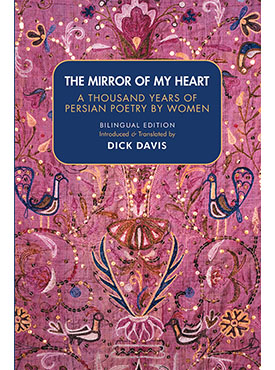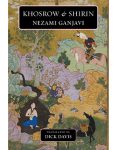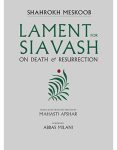About the Book
This new bilingual edition of The Mirror of My Heart – the poems in Persian and English on facing pages – is a unique and captivating collection introduced and translated by Dick Davis, an acclaimed scholar and translator of Persian literature as well as a gifted poet in his own right. In his introduction he provides fascinating background detail on Persian poetry written by women through the ages, including common themes and motifs and a brief overview of Iranian history showing how women poets have been affected by the changing dynasties. From Rabe’eh in the tenth century to Fatemeh Ekhtesari in the twenty-first, each of the eighty-four poets in this volume is introduced in a short biographical note, while explanatory notes give further insight into the poems themselves.
One of the very first Persian poets was a woman (Rabe’eh, who lived over a thousand years ago) and there have been women poets writing in Persian in virtually every generation since that time until the present. Before the twentieth century they tended to come from society’s social extremes. Many were princesses, a good number were hired entertainers of one kind or another, and they were active in many different countries – Iran of course, but also India, Afghanistan, and areas of central Asia that are now Uzbekistan, Turkmenistan, and Tajikistan. Not surprisingly, a lot of their poetry sounds like that of their male counterparts, but a lot doesn’t; there are distinctively bawdy and flirtatious poems by medieval women poets, poems from virtually every era in which the poet complains about her husband (sometimes light-heartedly, sometimes with poignant seriousness), touching poems on the death of a child, and many epigrams centered on little details that bring a life from hundreds of years ago vividly before our eyes.
Contents/Excerpt
Introduction xi
The Medieval Period xx
From 1500 to the 1800s xxx
From the 1800s to the Present xxxviii
Selecting the Poems in this Volume lviii
Translator’s Note lxviii
A Note on the Sources lxix
Acknowledgments lxxiii
A Note on Iranian Dynasties lxxiv
Map Showing the Places Mentioned in the Book lxxvi
The Medieval Period 1
From 1500 to the 1800s 53
From the 1800s to the Present 107
Notes 238
THE POETS
The Medieval Period
Rabe’eh, 3
Mahsati, 7
Anonymous, 15
Motrebeh, 16
Daughter of Salar, 17
Aysheh Samarqandi, 18
Fatemeh Khorasani, 20
Padshah Khatun, 21
Delshad Khatun, 23
Jahan Malek Khatun, 24
Mehri, 43
Atuni, 48
Zaifi Samarqandi, 50
Ofaq Jalayer, 51
From 1500 to the 1800s
Pari Khan Khanom, 55
Dusti, 57
Golchehreh Beigum, 58
Golbadan Beigum, 59
Bija Shahi, 60
Bija Nehani Qa’emi, 61
Tuni, 62
Bibi Mah Ofaq, 63
Hejabi, 64
Jamileh Esfahani, 65
Nehani Shirazi, 66
Nur Jahan, 67
Makhfi, 70
Zinat al-Nissa Beigum, 76
Soltan Daghestani, 77
Agha Beigum, 78
Hayati, 79
Aysheh Afghani, 80
Reshheh, 83
Maluli, 86
Effat, 89
Agha Baji, 90
Qamar Qajar, 91
Esmat Khanom, 92
Jahan Khanom, 93
Efaf, 94
Fakhri, 95
Mariam Khanom, 96
Mastureh Kurdi, 97
Mastureh Guri, 104
Shah Jahan Beigum of Bhopal, 105
Baligheh-ye Shirazi, 106
From the 1800s to the Present
Tahereh, 109
Shahdokht, 114
Soltan, 115
Gowhar, 116
Gowhar Beigum Azerbaijani, 118
Shahin Farahani, 119
Makhfi-ye Badakhshi, 120
Farkhondeh Savji, 121
Jannat, 122
Kasma’i, 126
Nimtaj Salmasi, 128
Alam Taj, 129
Zinat Amin, 140
Batul Adib Soltani, 142
Parvin Etesami, 143
Zhaleh Esfahani, 155
Simin Behbahani, 164
Lobat Vala, 174
Forugh Farrokhzad, 179
Tahereh Saffarzadeh, 189
Mina Assadi, 192
Nazanin Nezam Shahidi, 195
Fevzieh Rahgozar Barlas, 197
Soheila Amirsoleimani, 199
Farzaneh Khojandi, 201
Azita Ghahreman, 202
Parween Pazhwak, 204
Khaledeh Forugh, 207
Mandana Zandian, 210
Mana Aqai, 212
Pegah Ahmadi, 214
Granaz Moussavi, 216
Sara Ardehali, 219
Shabnam Azar, 224
Rosa Jamali, 226
Hengameh Hoveyda, 229
Fatemeh Shams, 230
Fatemeh Ekhtesari, 234
About the Author
Dick Davis brings a unique array of gifts to the challenges of translating Hafez and his contemporaries. In his own right, he is a poet of great technical accomplishment and emotional depth. He is also the foremost English-speaking scholar of medieval Persian poetry now working in the West. Numerous honors testify to his talents. In the U.K., he received the Royal Society of Literature’s Heinemann Award for his second book of poems, Seeing the World, in 1981; his Selected Poems was chosen by both the Sunday Times and the Daily Telegraph as a Book of the Year in 1989; and his collection Belonging was selected as the Poetry Book of the Year by The Economist in 2003. In the U.S., A Kind of Love—the American edition of his Selected Poems—received the Ingram Merrill prize for “excellence in poetry” in 1993. He has received awards for his scholarship from the Arts Council of Great Britain, The British Institute of Persian Studies, and the Guggenheim Foundation, and he is the recipient of grants for his translations from the National Endowment for the Humanities and the National Endowment for the Arts. Twice, in 2000 and 2001, he received the Translation Award of the International Society for Iranian Studies, and in 2001 he received an Encyclopedia Iranica award for “services to Persian poetry.” His translation of Ferdowsi’s Shahnameh: the Persian Book of Kings was chosen as one of the “ten best books of 2006” by the Washington Post.
Davis read English at Cambridge, lived in Iran for eight years (he met and married his Iranian wife Afkham Darbandi there), then completed a PhD in Medieval Persian Literature at the University of Manchester. He has resided for extended periods in both Greece and Italy (his translations include works from Italian), and has taught at both the University of California and at Ohio State University, where he was for nine years Professor of Persian and Chair of the Department of Near Eastern Languages, retiring from that position in 2012. In all, he has published more than twenty books and is a Fellow of the Royal Society of Literature.
Among the qualities that distinguish his poetry and scholarship are exacting technical expertise and wide cultural sympathy—an ability to enter into distant cultural milieus both intellectually and emotionally. In choosing his volume of poems Belonging as a “Book of the Year” for 2006, The Economist praised it as “a profound and beautiful collection” that gave evidence of “a commitment to an ideal of civilized life shared by many cultures.” the Times Literary Supplement has called him “our finest translator of Persian poetry.” In 2009 Mage published a book of Dick Davis’s own poems about Iran: At Home and Far From Home: Poems on Iran and Persian Culture. His book about the Shahnameh, Epic and Sedition was published by Mage in paperback in 2006. His books of translations are: Borrowed Ware: Medieval Persian Epigrams (1998), The Shahnameh (2004); The Legend of Seyavash (2004); Rostam: Tales of Love and War from Persia’s Book of Kings (2007); Vis and Ramin (2008); Faces of Love: Hafez and the Poets of Shiraz (2012).








